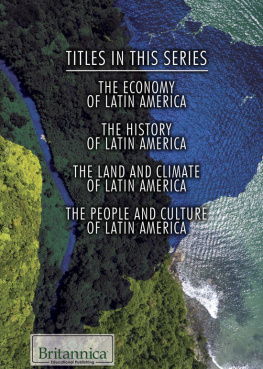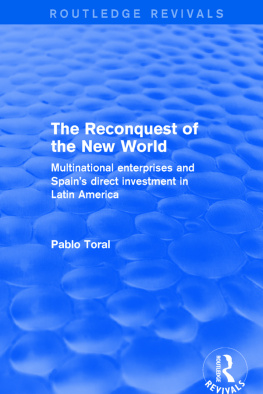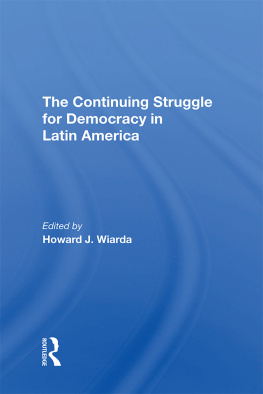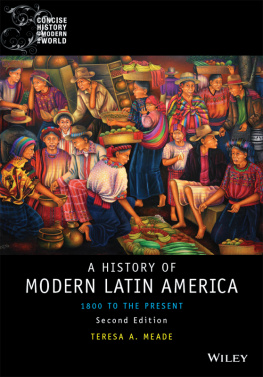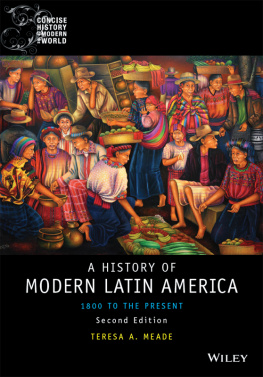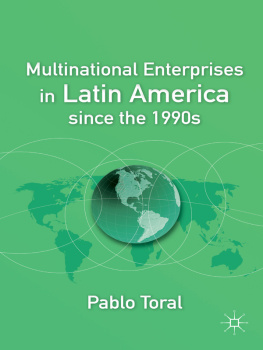A New Struggle for Independence in Modern Latin America
This volume explores several notable themes related to foreign affairs in Latin America and the reconfiguration of the power of the different states in the region. It offers insightful historical perspectives for understanding national, regional, and global issues from the beginning of the 20th century to the present day, from analysis of the traditional hegemony of the United States over Latin America through its military and political influence due to the presence of the European Union, Russia, and China. These views cannot be reduced to a simplistic vision of the dominant and subordinate; rather, they attempt to seek lines of continuity by highlighting traditional interpretations of new scenarios such as regional trading and security blocs. The volume refuses to impose a traditional and uncritical linear historical narrative onto the reader but instead proposes an alternative interpretation of the past and its relation to the present. Finally, the growing importance of international mechanisms in enabling the success of certain Latin American regimes is also highlighted, in particular, the influence of regional diffusion through international organizations or other networks.
Pablo A. Baisotti is currently a research assistant at the Department of Latin American Studies (ELA) at the University of Brasilia.
Routledge Studies in the History of the Americas
19 The Unheard Voice of Law in Bartolom De La Casas Brevsima Relacin de la Destruicin de las Indias
David T. Orique
20 The Nixon Administration and Cuba
Continuity and Rupture
Hkan Karlsson and Toms Diez Acosta
21 Translating Cuba
Literature, Music, Film, Politics
Robert S. Lesman
22 Rio de Janeiro in the Global Meat Market, c. 1850 to c. 1930
How Fresh and Salted Meat Arrived at the Carioca Table
Maria-Aparecida Lopes
23 American Divergences in the Great Recession
Daniele Pompejano
24 Social and Political Transitions During the Left Turn in Latin America
Edited by Karen Silva-Torres, Carolina Rozo-Higuera and Daniel S. Leon
25 A New Struggle for Independence in Modern Latin America
Edited by Pablo A. Baisotti
26 Problems and Alternatives in the Modern Americas
Edited by Pablo A. Baisotti
For more information about this series, please visit: https://www.routledge.com/Routledge-Studies-in-the-History-of-the-Americas/book-series/RSHAM
First published 2022
by Routledge
605 Third Avenue, New York, NY 10158
and by Routledge
2 Park Square, Milton Park, Abingdon, Oxon, OX14 4RN
Routledge is an imprint of the Taylor & Francis Group, an informa business
2022 Taylor & Francis
The right of Pablo A. Baisotti to be identified as the author of the editorial material, and of the authors for their individual chapters, has been asserted in accordance with sections 77 and 78 of the Copyright, Designs and Patents Act 1988.
All rights reserved. No part of this book may be reprinted or reproduced or utilised in any form or by any electronic, mechanical, or other means, now known or hereafter invented, including photocopying and recording, or in any information storage or retrieval system, without permission in writing from the publishers.
Trademark notice: Product or corporate names may be trademarks or registered trademarks, and are used only for identification and explanation without intent to infringe.
Library of Congress Cataloging-in-Publication Data
A catalog record for this title has been requested
ISBN: 978-0-367-48748-5 (hbk)
ISBN: 978-0-367-49257-1 (pbk)
ISBN: 978-1-003-04268-6 (ebk)
DOI: 10.4324/9781003042686
Typeset in Sabon
by codeMantra
Carlos Escud
DOI: 10.4324/9781003042686-2
If either wealth or poverty are come by honesty, there is no shame.
(Confucius)
Introduction
To anyone with knowledge of Argentine history, it is patently clear that the replacement, in 1945, of the U.K. by the U.S. as the hegemon in the Southern Cone region of the Americas had ruinous consequences for Argentina, for the simple reason that (albeit in an asymmetrical way) the Argentine and British economies complemented each other, but there was practically nothing that the U.S. needed from Argentina. This has not changed.
Notwithstanding, with the recent decline of the U.S. and the rise of China, new prospects have emerged, because the Peoples Republic of China (PRC) has an economy that is complementary to that of Argentina.
In this context, if Argentina is to reverse its descent and make good use of this new opportunity, it is urgent to learn from the lessons of the past. This chapter is divided into three major sections: 18601942, 19421955 and 20032020. It is largely based on original research undertaken by the author.
Section I The Anglo-Argentine Connection, 18601942
The Economic Dimension of the Anglo-Argentine Connection
According to one of the great economic historians of Argentina, the late Cuban-American Carlos Daz-Alejandro:
From 1860 to 1930 Argentina grew at a rate that has few parallels in economic history, perhaps comparable only to the performance during the same period of other countries of recent settlement. The expansion was most remarkable until the outburst of World War I; the fifty years before 1914 witnessed in Argentina one of the highest growth rates in the world for such a prolonged period of time [] During 19001930, Pampean real wages seemed higher than in some European cities. A comparison of hourly wages in 191114 between Buenos Aires and Paris and Marseille for seven different categories showed the Buenos Aires wage rates higher than those in Marseille in all categories (by about 80%), and higher than most corresponding Parisian wage rates (on average by about 25%). A 1921 report of the British Department of Overseas Trade stated that Argentine wages before World War I were higher than in European countries [].
(Daz-Alejandro 1970, 1, 41, 43, 44)
This expansion was basically the product of the complementary character of the Argentine and British economies. This complementarity produced both trade and capital investments to an extent that was undreamed of before in Argentina. The flow of capital and trade was concomitant with the flow of immigrants and with expansion in production. By 1890, 174.8 million were invested by Britain in Argentina. By 1909, this sum had grown to 291 million, of which 166.4 were in railways, a basic service for the transportation of Argentine goods to the port. By 1913, this sum had grown further to 357.7 million. The evolution of British capital in Argentina can be followed in ).
To put the U.S. into the picture, it should suffice to say that until the mid-1920s, both French and German investments amounted to more than the U.S. total. During the 1930s, U.S. investments occupied the second place, but very far behind the U.K. and not too far ahead of France (. Thus, although the U.S. had an interest in Argentina, it was far from attaining the level of capital penetration of the Argentine economy that the U.K. had achieved.
Table 1.1British Capital in Argentina, 19131943 (in Millions of Pounds)
| 1913 | 357.7 | 1929 | 432.7 | 1937 | 441.5 |
| 1918 | 379.5 | 1930 | 435.1 | 1938 |



